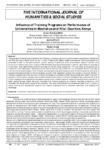| dc.description.abstract | The purpose of this study was to examine the influence of training programs on performance of universities in Machakos and Kitui Counties in Kenya which are four in total. A descriptive research design was adopted. The target population comprised of staff in the administration, human resource, finance and audit, procurement, deans of schools and directorate of quality assurance to taling to 263. Stratified sampling was employed to identify respondents for purposes of this study, using departments as the strata basis. Of the 263 target population, 17% was taken as the sample size translating to 45 respondents. Questionnaire was used as the main data collection tool, complemented with interviews with some of the heads of department. The data was analyzed using both descriptive and inferential statistics. Inferential analysis techniques included correlation analysis, multiple linear regression analysis and analysis of variance (ANOVA). The study revealed that when you train university employees on all aspects of their job and gives them insight into other positions in the university; develop well-rounded individuals who have a working knowledge of their positions and those of their colleagues. Knowledgeable employees are better able to answer customer questions, handle problems and deliver better quality services. Hence, the study concluded that training programs do influence individual productivity and ultimately the overall performance of the university. The study recommends that universities need to put in place a robust training and development program that ensures employees have a consistent experience and background knowledge. | en_US |

